 Last week, I was the final speaker in our department’s grad student association speaker series (which also marked the last day of classes for AY 2015-2016, hooray!), called “Rough Cut” – designed to expose current grad students to research-in-progress. I had signed up much earlier in the semester, and as the date drew closer, I wondered: did the grad students really want to hear about my interventions into PRC history and the cultural history of 20th c. China? Sure, listening to how fully (or semi-fully) fledged scholars are working through projects-in-process is useful – but most of me was saying ‘This has very little overlap with what most of our grad students do, and they will listen politely and ultimately leave not having learned a whole hell of a lot of useful stuff.’ They’re a very nice bunch, but subjecting people I like to 20 or 30 minutes of talk on something they have little background in seemed … selfish, to say the least. So I decided to do something a little different – instead of talking through the intricacies of my research in process, I’d walk them through how I got from a 2nd year research paper, to a dissertation, to a manuscript in progress. At the very least, I might be able to drop a few pieces of advice that might prove useful – even to people doing work that’s radically different than mine, in area and in emphasis. It was quite possibly just as useless as talking about my research, and only my research; but the intent was, at the very least, to be a bit broader and more useful.
Last week, I was the final speaker in our department’s grad student association speaker series (which also marked the last day of classes for AY 2015-2016, hooray!), called “Rough Cut” – designed to expose current grad students to research-in-progress. I had signed up much earlier in the semester, and as the date drew closer, I wondered: did the grad students really want to hear about my interventions into PRC history and the cultural history of 20th c. China? Sure, listening to how fully (or semi-fully) fledged scholars are working through projects-in-process is useful – but most of me was saying ‘This has very little overlap with what most of our grad students do, and they will listen politely and ultimately leave not having learned a whole hell of a lot of useful stuff.’ They’re a very nice bunch, but subjecting people I like to 20 or 30 minutes of talk on something they have little background in seemed … selfish, to say the least. So I decided to do something a little different – instead of talking through the intricacies of my research in process, I’d walk them through how I got from a 2nd year research paper, to a dissertation, to a manuscript in progress. At the very least, I might be able to drop a few pieces of advice that might prove useful – even to people doing work that’s radically different than mine, in area and in emphasis. It was quite possibly just as useless as talking about my research, and only my research; but the intent was, at the very least, to be a bit broader and more useful.
It went OK. Luckily, I was the only speaker on the agenda, because I blathered on for 40 minutes (the ‘ideal’ time was 15 or 20 – I’m usually much better at reining myself in, although I did know I’d be the only speaker). While chewing my nails and worrying at a colleague afterwards, she said: ‘You managed to sum up your entire grad career in 40 minutes, which is pretty good!’ I did gallop through quite a lot, both in terms of explaining my own research and (the more important bit) talking about process and what I wish I’d known when I started writing a dissertation.
Preparing the talk provided a nice bit of reflection and perspective, which I badly needed at the end of a semester (academic year, at that) that left me feeling pretty demoralized and defeated. I’ve been in pretty bad headspace since last fall & have been making concerted efforts to get myself out (not the easiest thing, but I’m glad some healthy habits are starting to stick!), and it’s easy to get trapped in those negative feelings. So throwing together a PowerPoint on my grad school career helped refocus me on my mss (and this is the ‘Summer of the Book,’ since the mss needs to be done & ready to go out by August), and think about all the good stuff I’ve done since I got to grad school in 2007.
In any case, amongst all the other stuff I talked about – the need to be strategic, the need to think about how you’ll sell your project to scholars in a variety of fields, the necessity of getting critical (and sometimes painful) feedback – I talked about having talismans for your work. Things you can brush up against while in the thick of things, that have meaning for you, but not necessarily for the work as a whole. This may not be a necessity for many people, but it’s necessary for me. My talismans, as I explained to the seminar room, are literary: I showed them the epigraphs from my dissertation, which include a line about archives from a not-terribly-distinguished book on the murder of the Russian imperial family in 1918, a line from the terribly distinguished Lantingjixu by Wang Xizhi, and a good clip of T.S. Eliot’s “Burnt Norton” from Four Quartets (I’ve written a bit about the latter – well, hell, the other two, as well – at various points in this blog). I don’t think talismans need to be literary, but mine are – they help me recenter myself when I’m lost in the chaos of research, writing, and editing.
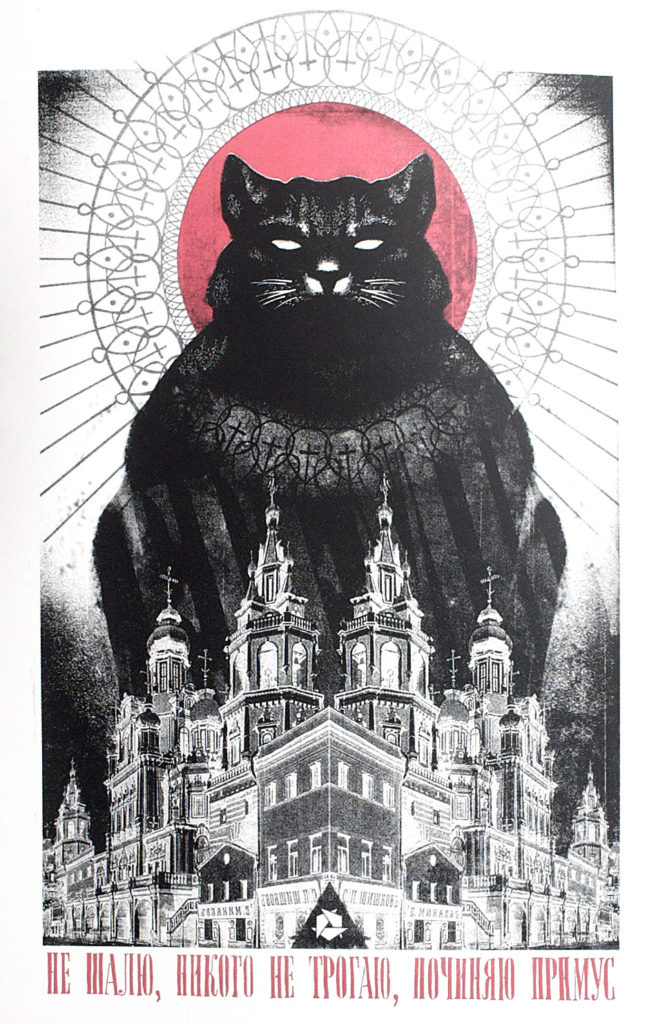 I ended the whole presentation with another, newer talisman – one of the most famous quotes from Bulgakov’s The Master and Margarita, “Manuscripts don’t burn.” At the end of my first year at MSU, a colleague recommended the novel to me – I’d never read it, and in truth, have shied away from fiction for years (that goes for films, too). Documentaries, non-fiction, non-Chinese-history-monographs and the like, fine – I have consumed a lot of those since I started grad school, but my affection for fiction had really waned. The Master and Margarita was one of the first novels I’d read in years, and I loved it. Part of it was the description of life in the Soviet socialist literary system: the first few chapters were so on point! I recognized all of it. I remember sending an email at 3 AM – having been up a good chunk of the evening and wee hours reading – to the colleague who had recommended it, saying how fabulous it was. The rest of the novel was just magical, and absurd, and utterly wonderful. I recently passed it off to a friend who just finished her dissertation a few weeks ago – she said she was overwhelmed with choices of novels to read now that she had time, and so I handed over my copy of Bulgakov’s masterpiece.
I ended the whole presentation with another, newer talisman – one of the most famous quotes from Bulgakov’s The Master and Margarita, “Manuscripts don’t burn.” At the end of my first year at MSU, a colleague recommended the novel to me – I’d never read it, and in truth, have shied away from fiction for years (that goes for films, too). Documentaries, non-fiction, non-Chinese-history-monographs and the like, fine – I have consumed a lot of those since I started grad school, but my affection for fiction had really waned. The Master and Margarita was one of the first novels I’d read in years, and I loved it. Part of it was the description of life in the Soviet socialist literary system: the first few chapters were so on point! I recognized all of it. I remember sending an email at 3 AM – having been up a good chunk of the evening and wee hours reading – to the colleague who had recommended it, saying how fabulous it was. The rest of the novel was just magical, and absurd, and utterly wonderful. I recently passed it off to a friend who just finished her dissertation a few weeks ago – she said she was overwhelmed with choices of novels to read now that she had time, and so I handed over my copy of Bulgakov’s masterpiece.
In any case, since “Manuscripts don’t burn” is such a famous line, it feels trite to pick it as a talisman, and yet – it’s oh-so-appropriate. I use it to remind myself that as much as I love my wonderful intellectuals, they wrote and said and did things that (whether I agree with it or not) ran afoul of powerful elements of the CCP. Those “manuscripts” don’t burn. I owe it to them to tell their stories, warts and all; you can’t expunge the flip side of the ‘brave intellectuals standing up in the face of Mao’s vision run amok,’ which is, ‘Oh my god, what were they thinking, criticizing the ’emperor.” Often when I’m writing through the 1960s, I find myself cringing as one does when watching a horror film: ‘Oh no, don’t do that, don’t say that, oh god.’ Obviously I come down on one side of that particular history, but their story is more compelling by the fact that they must have known what they were saying and doing. To render Meng Chao’s ultimate fate evidence of nothing more than the capriciousness of Mao et al. is ultimately, I think, a disservice to someone who wrote and published (in multiple versions!) lines like:
My worry is for the bitterness of refugees of disasters,
My worry is for the resentment of those forced to wander.
The lakeside scene glitters,
But the howling of the people of Lin’an is more desperate than the howling of ghosts.
Under the hand of Jia Sidao,
Even after death, it’s difficult to find peace!
Even if we’re going to play the whole ‘Oh, they were talking about the prime minister, not the emperor, ergo weren’t talking about Mao himself!’ game, putting into public writing (and performance!) – even just a few lines - worrying about starving people who are in desperate situations while government officials take pleasure in partying at West Lake is pretty provocative in the early 1960s, during and after the disaster of the Great Leap Forward & resulting famine.
So that manuscript doesn’t burn. None of them do. That’s not a bad thing.
However, I didn’t end my talk on that morose note; I ended it on a slightly more upbeat, worthy-of-a-bad-motivational-poster, yet still melancholy note. Our manuscripts don’t burn, and that’s also not a bad thing. It’s worth reflecting on failures, and remembering that every misstep along the way to a journal article, dissertation, or mss (or job entirely out of the academy) has something to offer. I have spent so much time writing things that wound up shuffled into a file somewhere; so much time reading sources that didn’t pan out (bad enough in English; triply painful in Chinese, at least for me); so much time roughing out projects that don’t pan out as you anticipate. Time spent building courses that don’t work. Time picking out readings that don’t work for courses that kinda do. Etc. etc. etc ….
Every academic career is, in some measure, a history of failure. Some more so than others – often, as has been frequently discussed, due to nothing other than the vagaries of the market. But a Princeton professor’s recent “CV of failures” made some traction on my lists in various places, and it is potentially useful to meditate on, I think (of course, as a follow-up oped in the same paper pointed out, “Only successful people can afford failures” – which is also true, and deserves as much rumination. It’s a lot easier to publicize your failures when safely ensconced in a tenure-track position (having come from a position of relative Privilege) at an elite university – or a non-elite one, for that matter). But ultimately, few people come out of the gate and have no stumbles, in any career. As much as I feel like a bad motivational poster for saying so, I have learned a lot from my failures, big and little. I have been blessed in my career since starting grad school, but I’ve fallen flat on my face plenty. The successes I’ve had have generally felt like completely bizarre, totally unexpected bright spots in the midst of disaster. And that’s not just my anxiety speaking: there were several times when senior people expressed some measure of surprise of ‘Oh, that worked out for you!’ at critical points in my career.
But. Manuscripts don’t burn. The history of my career doesn’t burn, the mistakes I made haven’t, and ultimately – while I don’t think they’ve made me the historian I am, they made me the Chinese historian I am.
It’s finals week, so I’ve been catching up on grading, getting a lot of work done, and also tried to wind down from a  stressful year by watching documentaries and other things that make me happy. There’s a wonderful line in the documentary Elusive Muse (the subject of which is Suzanne Farrell, the last great Balanchine muse – I’ve written about that a bit here, too), which I watched a few days ago while zoning out on the couch. The choreographer Maurice Béjart, who took Farrell and her husband in after they left the New York City Ballet, had this to say on why Farrell was one of the great dancers of the 20th century (and probably ever):
stressful year by watching documentaries and other things that make me happy. There’s a wonderful line in the documentary Elusive Muse (the subject of which is Suzanne Farrell, the last great Balanchine muse – I’ve written about that a bit here, too), which I watched a few days ago while zoning out on the couch. The choreographer Maurice Béjart, who took Farrell and her husband in after they left the New York City Ballet, had this to say on why Farrell was one of the great dancers of the 20th century (and probably ever):
She was different … and she was even different from the Balanchine girls … she was completely different, and – I was very surprised – she had a freedom of movement, with a very clear technical power. But you never felt the technical, you felt the freedom and the musicality. I mean, she’s like – she’s like a violin, I mean, the music comes out from her body.
I’ve heard Béjart utter those lines – and they are memorable ones, I’ve quoted them (badly) to people at several points – any number of times, but something clicked for me in the past two weeks. I want to be technically skilled; but I don’t want people to see it necessarily, because I want to weave a great story. I want it to come out from my writing; I want to be an instrument of a sort – I want the story to come out, which relies on the technical power, while rendering that relatively invisible.
Talismans: they’re important, no matter what you do. And … manuscripts don’t burn. Farrell was great partially because she simply – after a point – wasn’t afraid of making mistakes, which made her highest highs (which were supreme!) possible. A useful lesson, hard as it is to remember when tenure and the judgment of various people (the vast majority of whom aren’t in your field & want to know what you’re not doing XYZ to contribute in ABC ways) are breathing down your neck.


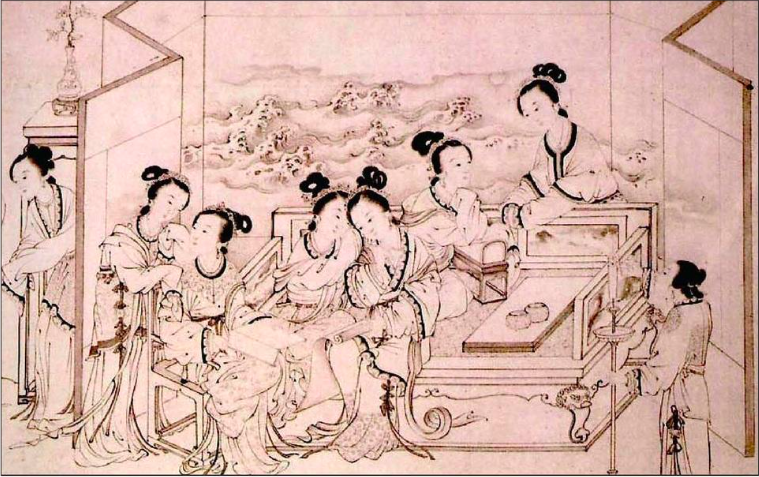 actually happen – another star serves as the “bridge”). This has, as far as I know, turned into some bizarre Valentine’s Day spin-off (at least partially), but originally, it was a celebration of women’s work (one of its alternate names is the Qiqiaojie 乞巧节, the ‘Begging for Skills Festival,’ referencing domestic skills & the practice of qiqiao 乞巧, making offerings to the Weaving Girl and holding competitions related to domestic tasks, like threading needles only by the light of the moon) & also one hoping for love or celebrating bonds. Or for missing lovers who were absent – not uncommon, at least among the poetry-writing literati, when husbands were not infrequently off on far-flung bureaucratic assignments and the like. In any case, it’s always struck me as a good deal mopier than Valentine’s Day, for the coupled and singled alike.
actually happen – another star serves as the “bridge”). This has, as far as I know, turned into some bizarre Valentine’s Day spin-off (at least partially), but originally, it was a celebration of women’s work (one of its alternate names is the Qiqiaojie 乞巧节, the ‘Begging for Skills Festival,’ referencing domestic skills & the practice of qiqiao 乞巧, making offerings to the Weaving Girl and holding competitions related to domestic tasks, like threading needles only by the light of the moon) & also one hoping for love or celebrating bonds. Or for missing lovers who were absent – not uncommon, at least among the poetry-writing literati, when husbands were not infrequently off on far-flung bureaucratic assignments and the like. In any case, it’s always struck me as a good deal mopier than Valentine’s Day, for the coupled and singled alike.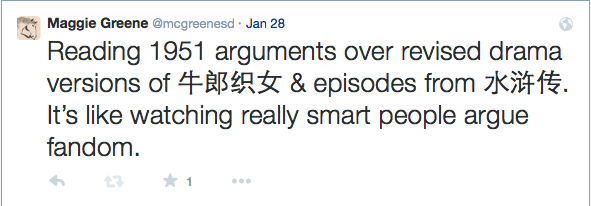
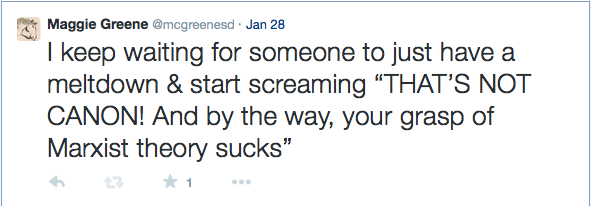


 When I started looking more seriously at older parts of the historiography, I realized the field had spent some time sorting many of these people into various categories. “Establishment” intellectuals, for instance, or “revolutionary” intellectuals. These divisions can be useful, to a point; but they can also obscure a larger point, which is there was frequently a lot more similarities between these people than sorting them into different “camps” would lead you to believe. I don’t mean to imply I think there weren’t differences, or that seemingly minor differences don’t have an impact. As the political trials and travails of the 1950s and early 1960s – never mind the Cultural Revolution – indicate, there were camps, and your opinion on certain matters could have deadly consequences. But at the same time, from a distance of 70 years, there are a lot more similarities than differences. All of the people in my 1951 debate, for instance, agreed that China’s traditional culture was important and should be preserved. They disagreed on what that preservation should look like (among other things). But they agreed on one of the most important things of all: that this was worth arguing about, fighting over.
When I started looking more seriously at older parts of the historiography, I realized the field had spent some time sorting many of these people into various categories. “Establishment” intellectuals, for instance, or “revolutionary” intellectuals. These divisions can be useful, to a point; but they can also obscure a larger point, which is there was frequently a lot more similarities between these people than sorting them into different “camps” would lead you to believe. I don’t mean to imply I think there weren’t differences, or that seemingly minor differences don’t have an impact. As the political trials and travails of the 1950s and early 1960s – never mind the Cultural Revolution – indicate, there were camps, and your opinion on certain matters could have deadly consequences. But at the same time, from a distance of 70 years, there are a lot more similarities than differences. All of the people in my 1951 debate, for instance, agreed that China’s traditional culture was important and should be preserved. They disagreed on what that preservation should look like (among other things). But they agreed on one of the most important things of all: that this was worth arguing about, fighting over.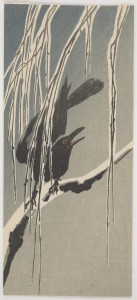 As I’ve noted before, academia can be full of pretty strange transitions – the leap from grad student to professor is an enormous one. A year and a half in, and I can say with some confidence I’m getting settled, but of course – this is not an overnight process. I’m lucky to be at a university where I have a lot of latitude with my teaching, so in addition to drilling down on my core classes (like the general modern East Asian history survey course, which I teach once a year), I’ve been experimenting with classes I may or may not ever teach again. But just because I don’t get a perfectly working syllabus out of a course doesn’t mean it’s a waste of a prep. I taught a slightly harebrained course on memory & culture in 20th century East Asia this past fall, and while I don’t think I’d ever try and do that again (at least, not as I had it set up!), I did get some fantastic feedback from my students regarding readings and films, general structure and themes, etc. that I will be incorporating into future courses. I try hard to be upfront with my students that a lot of things (like their professor) are works in progress & like soliciting feedback on what they liked (or didn’t), and I’ve generally been rewarded with really helpful commentary. So at least at the end of a semester, I can usually say I went out on a limb, it didn’t entirely work, but hey: I learned a lot & next time will be better.
As I’ve noted before, academia can be full of pretty strange transitions – the leap from grad student to professor is an enormous one. A year and a half in, and I can say with some confidence I’m getting settled, but of course – this is not an overnight process. I’m lucky to be at a university where I have a lot of latitude with my teaching, so in addition to drilling down on my core classes (like the general modern East Asian history survey course, which I teach once a year), I’ve been experimenting with classes I may or may not ever teach again. But just because I don’t get a perfectly working syllabus out of a course doesn’t mean it’s a waste of a prep. I taught a slightly harebrained course on memory & culture in 20th century East Asia this past fall, and while I don’t think I’d ever try and do that again (at least, not as I had it set up!), I did get some fantastic feedback from my students regarding readings and films, general structure and themes, etc. that I will be incorporating into future courses. I try hard to be upfront with my students that a lot of things (like their professor) are works in progress & like soliciting feedback on what they liked (or didn’t), and I’ve generally been rewarded with really helpful commentary. So at least at the end of a semester, I can usually say I went out on a limb, it didn’t entirely work, but hey: I learned a lot & next time will be better.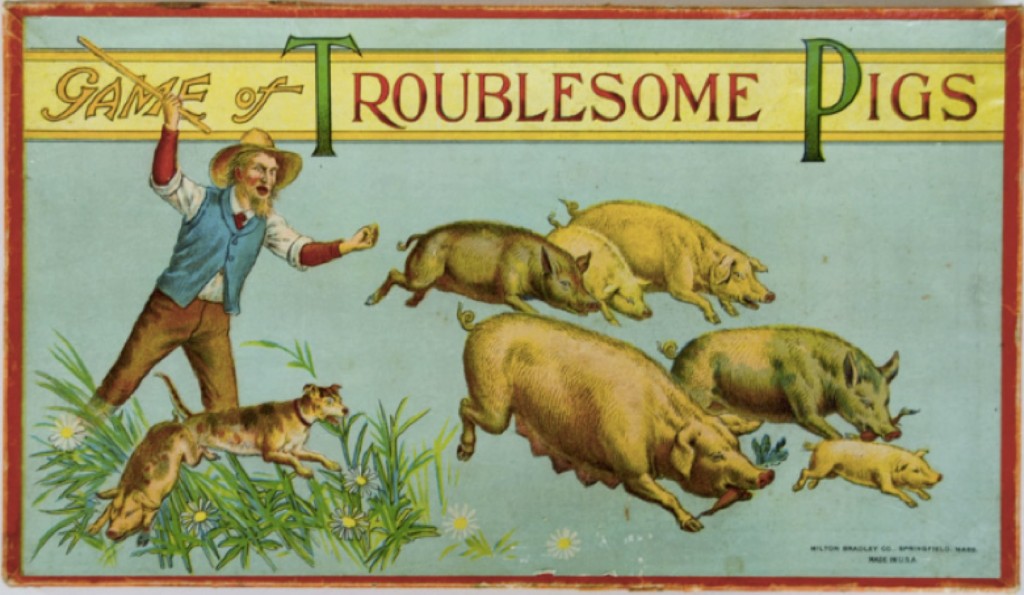

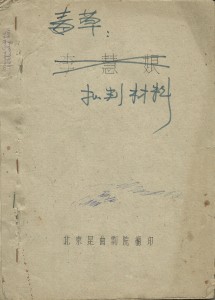
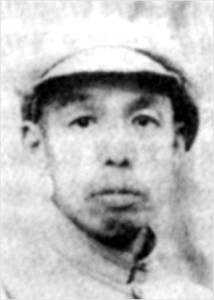

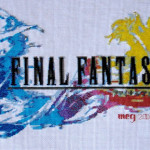


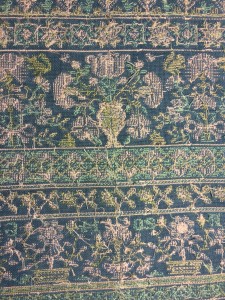
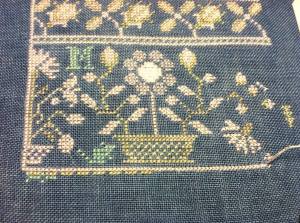
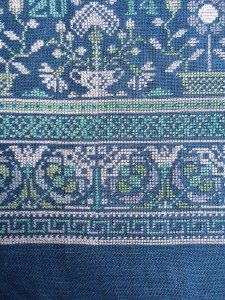
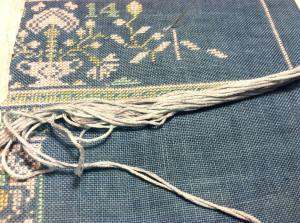
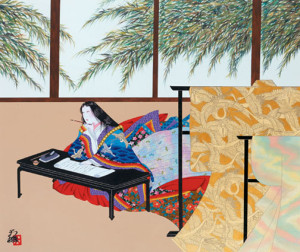
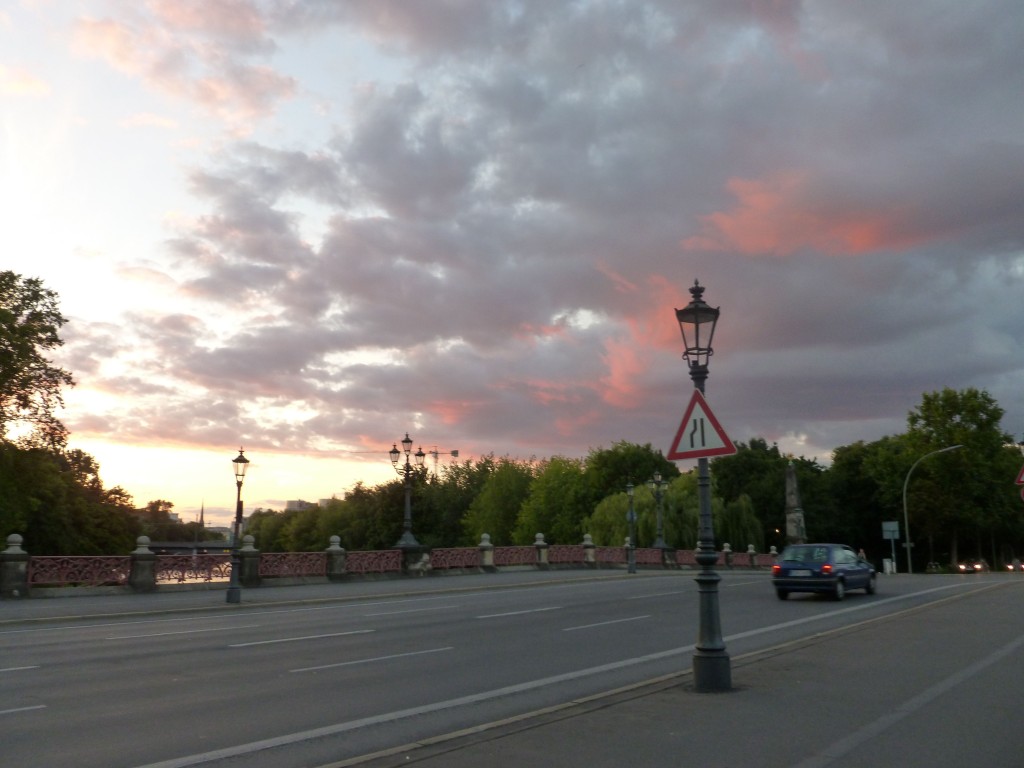



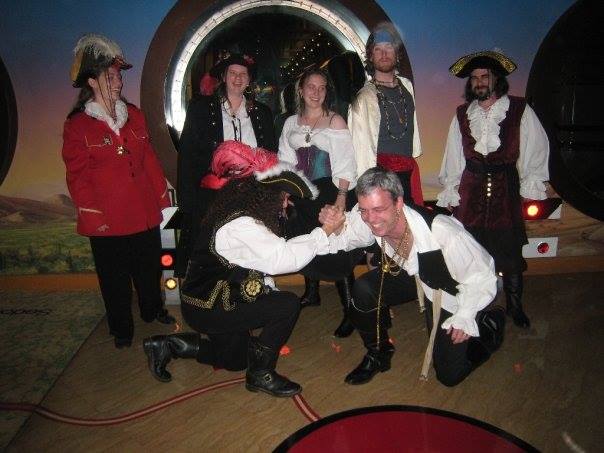
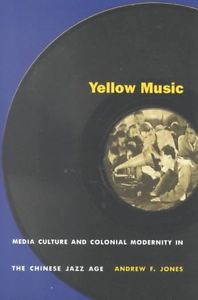 Games are interesting to plonk down in this context, because we treat them very differently than, say, Chinese opera: they’re global in a way a lot of other cultural products aren’t, almost from their inception. In Yellow Music, Andrew Jones discusses the circulation of jazz (and technology) in a way that’s resonated strongly with me over the years (in a monograph that has the hands-down best conceptual use of “colonial modernity” I’ve ever come across). He notes that one African- American’s account of the Chinese jazz age of 1930’s Shanghai “alerts us to the folly of trying to understand Chinese jazz as an example of Western influence on Chinese musical forms. Nor can the ‘Chinese’ in ‘Chinese jazz’ be relegated to the realm of the merely adjectival ….†He further notes that we must “look at the ways in which both (and indeed all) parties have been and continue to be inextricably bound up in a larger and infinitely more complex process.†While we sometimes append some sort of national marker to games (the ‘Japanese’ in JRPGs springs to mind here), we frequently don’t – often because national origins are obscured through translation and localization, and a rather interesting process of naturalization.
Games are interesting to plonk down in this context, because we treat them very differently than, say, Chinese opera: they’re global in a way a lot of other cultural products aren’t, almost from their inception. In Yellow Music, Andrew Jones discusses the circulation of jazz (and technology) in a way that’s resonated strongly with me over the years (in a monograph that has the hands-down best conceptual use of “colonial modernity” I’ve ever come across). He notes that one African- American’s account of the Chinese jazz age of 1930’s Shanghai “alerts us to the folly of trying to understand Chinese jazz as an example of Western influence on Chinese musical forms. Nor can the ‘Chinese’ in ‘Chinese jazz’ be relegated to the realm of the merely adjectival ….†He further notes that we must “look at the ways in which both (and indeed all) parties have been and continue to be inextricably bound up in a larger and infinitely more complex process.†While we sometimes append some sort of national marker to games (the ‘Japanese’ in JRPGs springs to mind here), we frequently don’t – often because national origins are obscured through translation and localization, and a rather interesting process of naturalization.